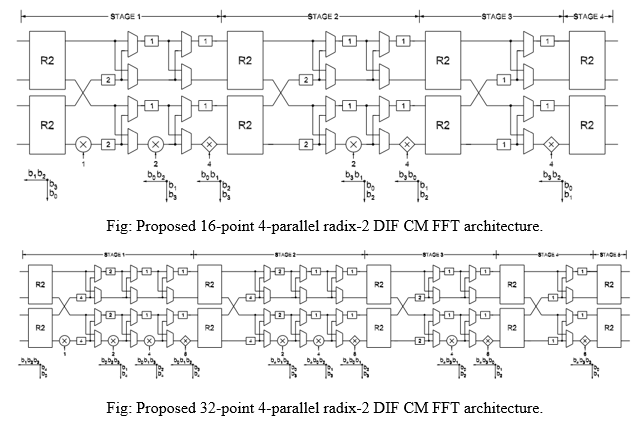The Constant Multiplier FFT
Also Available Domains DSP Core|Xilinx Vivado
Project Code :TVPGTO635
Abstract
In this project, we are designing a constant
multiplier architecture which will be used in the FFT implementation based on
the radix considered. The existing multipliers are based on different types
such as variable multipliers, or Cordic based multipliers etc. these cordic
based multipliers are nothing but rotators which are very simple to utilize but
the problem is considering of number of iterations to be consider. Here in this
suggested multiplier we are fixing the multiplier to perform a particular
operation based on the twiddle factor considered and thereby we can extract the
efficiency of the multiplier and thereby it will influence the efficiency of
the FFT. The paper explores the 16 point 4-parallel and 8-parallel CM DIF FFT,
which calculates the FFT entirely by using constant multipliers. Along with
them here we are also implementing the 16 point 4- parallel DIT FFT.
NOTE: Without the concern of our team, please don't submit to the college. This Abstract varies based on student requirements.
Block Diagram

Specifications
Software Requirements:
- Xilinx ISE 14.7 Tool
- HDL: Verilog
Hardware Requirements:
- Microsoft® Windows XP
- Intel® Pentium® 4 processor or Pentium 4 equivalent with SSE support
- 512 MB RAM
- 100 MB of available disk space
Learning Outcomes
- Basics of Digital Electronics
- VLSI design Flow
- Introduction to Verilog Coding
- Different modeling styles in Verilog
- Data Flow modeling
- Structural modeling
- Behavioral modeling
- Mixed level modeling
- Introduction to Fourier Transform
- Knowledge on Discrete Fourier Transform and Fast Fourier Transform
- Different multipliers such as complex multiplier and constant multipliers
- Knowledge on CORDIC algorithm
- Applications in real time
- Xilinx ISE 14.7/Xilinx Vivado for design and simulation
- Generation of Netlist
- Solution providing for real time problems
- Project Development Skills:
- Problem Analysis Skills
- Problem Solving Skills
- Logical Skills
- Designing Skills
- Testing Skills
- Debugging Skills
- Presentation Skills
- Thesis Writing Skills
Related Topics





 Paper Publishing
Paper Publishing
